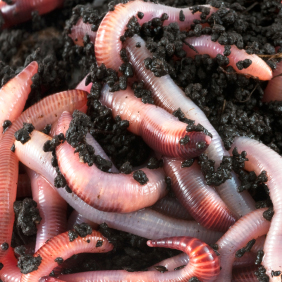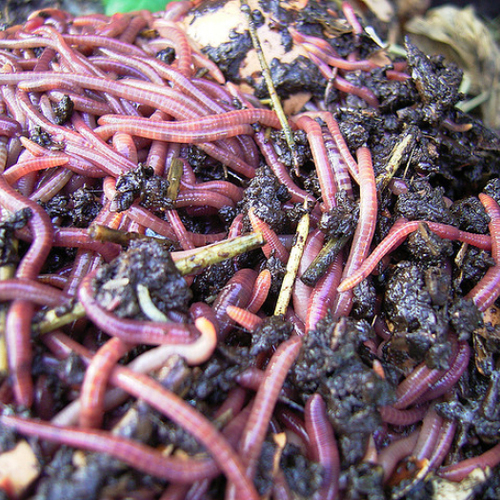Red wigglers: Feed your garden
Wiki Article
Why Red Wigglers Are Necessary for Organic Farming
Red wigglers play a critical function in chemical-free farming, primarily with their distinct capacity to decompose organic products and boost soil health and wellness. Their task not just improves the dirt with vital nutrients yet also cultivates a growing community vital for sustainable farming. The physical procedures they involve in, such as oygenation and moisture retention, add significantly to enhanced plant yields. The level of their effect on farming techniques and soil biology increases fascinating inquiries regarding the future of natural farming. red wigglers. What implications might this have for farming approaches?Role of Red Wigglers in Dirt Health And Wellness

In addition, red wigglers improve dirt structure by developing networks as they burrow. These channels enhance aeration and water seepage, promoting a much healthier root environment. Their activity also aids in maintaining ideal dampness degrees, which is essential for healthy plant growth.

Benefits of Worm Castings
Worm castings, the nutrient-rich waste matter created by red wigglers, offer as a powerful modification for natural farming. These spreadings are packed with essential nutrients such as nitrogen, phosphorus, and potassium, which are crucial for plant growth. Unlike synthetic plant foods, worm castings release nutrients gradually, giving a consistent supply over time and minimizing the risk of nutrient leaching and overflow.In addition, worm castings boost soil structure and oygenation, advertising healthier origin systems. Their high natural matter material boosts wetness retention, enabling plants to much better withstand drought problems. In addition, worm spreadings include valuable microorganisms that support plant health and wellness by subduing pathogens and enhancing vitamins and mineral uptake.
The application of worm castings can lead to boosted plant returns and improved quality of produce, making them a very useful source for organic farmers. Their usage also lines up with sustainable farming techniques, adding to dirt fertility without the negative environmental impacts associated with chemical fertilizers. In general, the consolidation of worm spreadings right into farming techniques cultivates an extra resistant and effective ecosystem, underscoring the relevance of red wigglers in natural farming systems.

Enhancing Nutrient Biking
(red wiggler fishing worms)Vitamins and mineral cycling is an essential process in natural farming, and the assimilation of red wigglers plays a critical duty in enhancing this cycle. As red wigglers consume decomposing organic issue, they secrete nutrient-rich castings, which are bursting with advantageous microbes.Moreover, red wigglers help to speed up the mineralization of nutrients, transforming them from inert forms right into bioavailable types that plants can soak up. This process is critical for keeping dirt fertility and advertising healthy and balanced crop growth. The visibility of red wigglers additionally urges a diverse soil community, promoting a balance of nutrients that supports various plant varieties.
Improving Dirt Framework
The enhancement of soil framework is crucial for cultivating a healthy agricultural community, and the activity of red wigglers substantially adds to this renovation. These earthworms play a vital duty in freshening the soil and developing a network of channels that help with water infiltration and root penetration. As they tunnel through the dirt, red wigglers separate compacted layers, allowing for much better oxygen exchange and advertising microbial activity.In addition, the raw material generated from their waste, recognized as vermicast, boosts dirt gathering. This process produces steady clumps of dirt bits, enhancing soil porosity and lowering disintegration (red wigglers). The visibility of red wigglers additionally urges the advancement of helpful fungal networks, which are important for nutrient uptake by plants
Promoting Sustainable Practices
Integrating red wigglers right into chemical-free farming practices not only enhances soil health however additionally advertises sustainable farming methods. These earthworms play an important role in nutrition cycling, changing organic waste into important compost that enhances the soil. By using red wigglers, farmers can successfully lower reliance on synthetic fertilizers, thus reducing chemical drainage and its detrimental effects on ecosystems.Moreover, the incorporation of red wigglers motivates the technique of reusing natural products, such as kitchen area scraps and farm waste. This waste reduction approach not just decreases disposal prices yet also fosters a closed-loop system where nutrients are constantly returned to the dirt (red wigglers). Such methods are red wiggler fishing worms vital in mitigating climate change, as they improve carbon sequestration and decrease greenhouse gas discharges
Additionally, red wigglers boost water retention in the dirt, which is critical in times of drought. Their burrowing tasks develop networks that allow water to pass through deeper right into the ground, hence advertising effective water use. Ultimately, incorporating red wigglers right into chemical-free farming not just supports biodiversity but also aligns with the concepts of lasting agriculture, supplying an all natural approach to food manufacturing.
Final Thought
In verdict, red wigglers play an essential role in organic farming by dramatically enhancing soil health and wellness and fertility. Hence, the assimilation of red wigglers right into farming methods is important for promoting sustainability and improving general dirt top quality.Report this wiki page